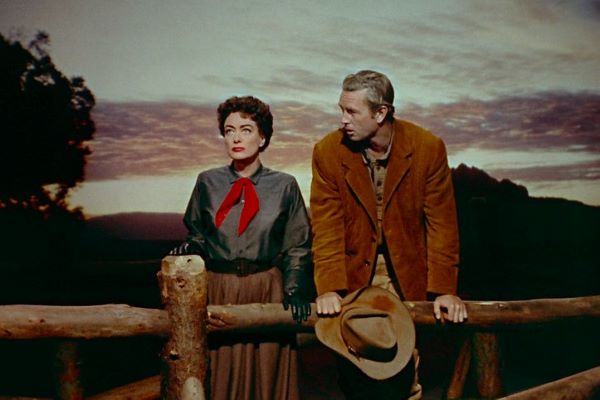Johnny Guitar is perhaps the oddest Western ever made. That sounds like a bold claim for a genre that boasts El Topo within its ranks, but examine Nicholas’s Ray’s lush, feverish film in the context of its contemporaries and it is a singular piece of work on multiple levels. Over a decade before the counter culture took off, Spaghetti Westerns upped the violence ante, Dennis Hopper got metafictional in The Last Movie, and Warren Beatty donned a fur coat and opened a brothel in McCabe and Mrs. Miller, Ray subverted gender roles, injected a lusty sensuality, a highly stylised aesthetic, and an adrenal shot of pure melodrama. Even by modern standards it stands out, so it’s not surprising that American audiences didn’t know what to make of it. It was championed, unexpectedly, by French critics.
Johnny Guitar (Sterling Hayden) arrives in a saloon on the outskirts of an Arizona town just in time to help the imperious owner Vienna (Joan Crawford) face down a mob of cattle ranchers, determined to run her out of town. The ringleader of the locals is ostensibly businessman John McIvers (Ward Bond), but the real power is Emma Small (Mercedes McCambridge), a rich woman with a love/hate relationship with Vienna’s outlaw associate The Dancin’ Kid (Scott Brady), and one of undiluted hatred towards Vienna herself. When The Kid and his gang later rob a bank and Vienna just happens to be present, Emma sees the opportunity to make sure Vienna hangs as an accomplice.
The film may be called Johnny Guitar, but it belongs to Crawford. As soon as Vienna appears on screen it lights a subversive charge that never dampens. Here is the female owner of the saloon, literally speaking down to her accusers from a mezzanine balcony. Clad in trousers and possessed of an iron self-reliance, she is as far removed from feminine Western archetypes as it was possible to be. Crawford is often read as being overtly masculine here, in a simplistic equation of manliness=power; one amplified by some grumbling from her staff prior to the posse’s arrival. ‘Never seen a woman who was more of a man. She thinks like one, acts like one, and sometimes makes me feel like I’m not.’ Her staff, and many critics, miss the point. Vienna is above all a pragmatist. She adopts masculine characteristics to wrongfoot her business competitors, and it is clearly much more sensible to wear denim than gingham if the need to reach for a gun is likely. She has also made no bones about having used her femininity and, more bluntly, her body to get to where she is. She sees nothing wrong with desiring someone and being desired, and it is revealed she has had previous with Mr. Guitar and, it is heavily implied, done some horizontal dancin’ with The Kid too.
Her nemesis Emma is her opposite, but is no less powerful, with McCambridge as mercurial and volcanic as Vienna is poised and steely. Desire proves a motivating force for her too, albeit the repression of it. She is ashamed of her desire for The Dancin’ Kid, and prefers to see him swing than to deal with it. She hates herself for it. And she hates Vienna for not feeling that shame. In fact, desire powers almost every look, gesture, and line of dialogue between practically every character, regardless of their sex. Rarely has there been a film so sexually charged that isn’t explicitly a romance. By the time a gun is finally pulled, it almost feels unnecessary and borderline crass in terms of phallic imagery.
It’s so full of subtext it almost bursts through its simple tale of greed and jealousy. It daringly thumbs its nose at McCarthyism in its depiction of the witch hunt against Vienna, with the leftist Ray casting the hysterical, coercive Emma as a cypher for the House Un-American Activities Committee. Even its very theatricality and garish aesthetic seem to be steering the viewer away from its actual narrative. Melodrama isn’t often associated with the Western, a form where a gruff stoicism traditionally wins out. It certainly wasn’t a genre associated with progressive politics, but again Johnny Guitar‘s perceived sense of camp and explosive emotional charge hide its pioneering, proto-revisionist spirit.
While Johnny Guitar is somewhat silly, it is supremely entertaining with a motto of ‘go big or go home’, and everyone involved is at their very biggest. Every choice made, from lighting, mise-en-scene, performance, dialogue, and colour palette seem counter intuitive to the idea of the Western as it was understood until that point. Somehow, what could have been a cracked Curate’s egg somehow coalesces into something great. It’s not a flawless film, but it’s one of those indomitable classics where the imperfections simply don’t matter. A breath of gaudy, subversive fresh air against the dust and grime of the traditional horse opera, and nearly seventy years on, one that has lost none of its radical spirit.
Available on Blu-ray from Mon 20 Sep 2021
